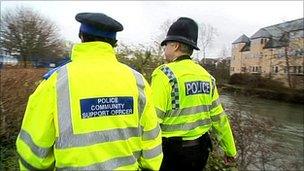'Concern' over police and crime commissioner elections
- Published

The elections have already been put back from May to November by Home Secretary Theresa May
A senior election official says he is concerned about the lack of preparation for the forthcoming elections for new police and crime commissioners.
John Turner, from the Association of Electoral Administrators, told BBC News it was "worrying" that key issues about the voting had not been resolved.
Voting takes place in 42 areas in England and Wales in November.
The Home Office said it was "confident" election rules would be ready in May to give officials enough time to prepare.
Single individual
The elections, part of the biggest shake-up of policing in England and Wales for almost 50 years, will herald the end of police authorities which were established in 1964 to hold chief constables to account.
Powers to set police force budgets and policing priorities, and hire and fire chief constables, will be transferred to a single individual, directly elected in each force area.
Known as a police and crime commissioner (PCC), the individual will also have powers to commission local crime reduction, community safety and victims' services.
But the elections, on 15 November, present election officials with considerable logistical problems because every police "constituency" will cross local authority boundaries.
The voting system - known as supplementary vote - is also relatively unfamiliar to many electors in the UK.
"We've never run elections quite like these before," said Mr Turner, chief executive of the Association of Electoral Administrators.
Free mail-shot
Mr Turner said it was standard practice to have six months to prepare, but rules governing the election, candidates and expenses had not been published, or approved, by Parliament.
He said the situation was "not good" because officials did not have enough detail.
"We don't have any conduct rules for running the the election. And the rules will also cover matters relating to candidates - nominations, campaigns, expense limits - and we don't have any information on those either," he said.
One of the key decisions still to be made is whether PCC candidates will be entitled to a free mail-shot to all voters in their constituency - as parliamentary, mayoral and European election candidates are allowed to do.
It is thought some potential candidates are being put off because they are not sure if they can afford the costs of the campaign without a free mail-shot.
Election workload
Mr Turner said he was also concerned that the electoral register, on which voting slips would be issued, would be 11 months out-of-date in November, meaning that about a third of details would be inaccurate.
He said a decision was needed as to whether a fresh electoral register would be drawn up so officials could plan their work.
Mr Turner pointed out that they also had local and mayoral elections to organise in May.
"As each week goes past it gets more worrying because it's difficult to see how you can fit it in with all the other pressures that start to exist as you roll through the year," Mr Turner said.
The Home Office said it was "confident" secondary legislation, containing the election rules, would be in place in May, giving officials the six months they needed.
But a spokesman said no decisions had been made about giving candidates a free mail-shot or whether the electoral roll would be updated.
- Published15 November 2011
- Published3 November 2011
- Published8 September 2011